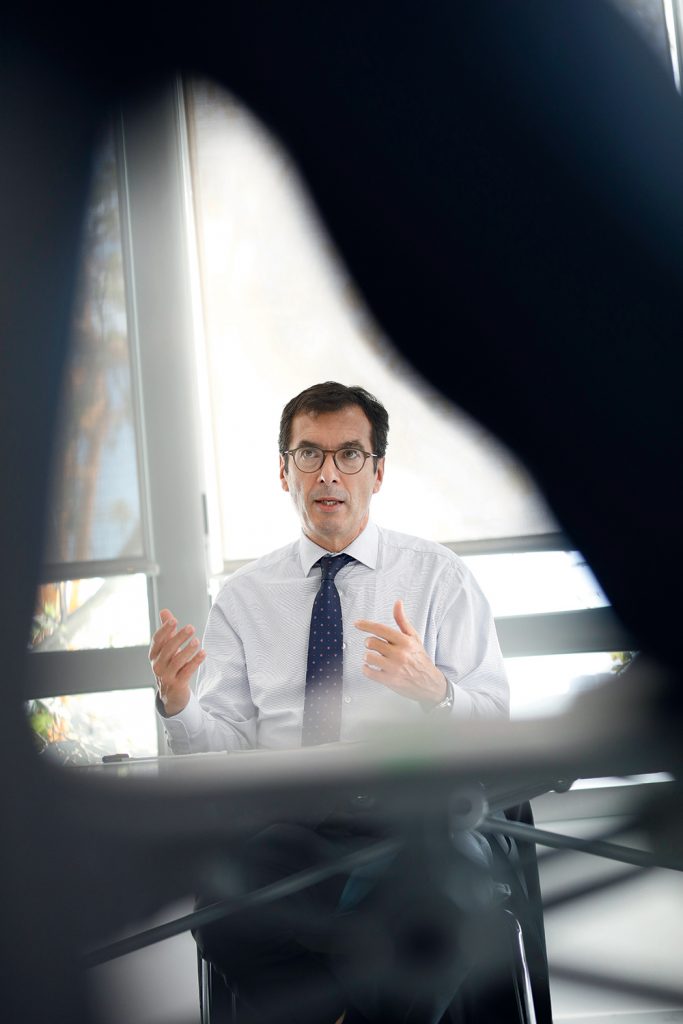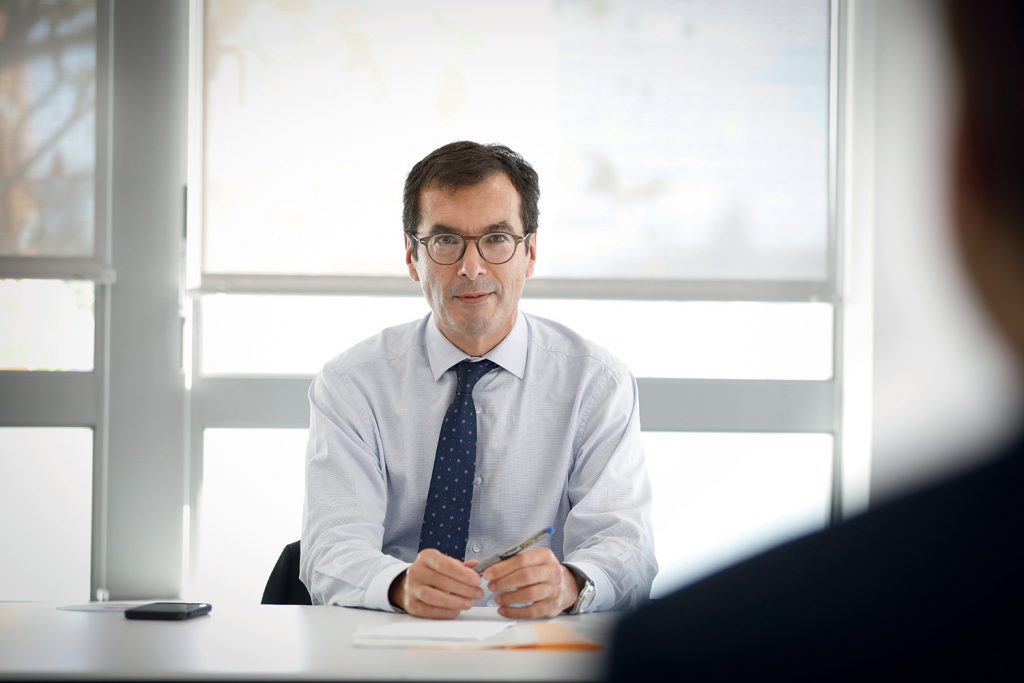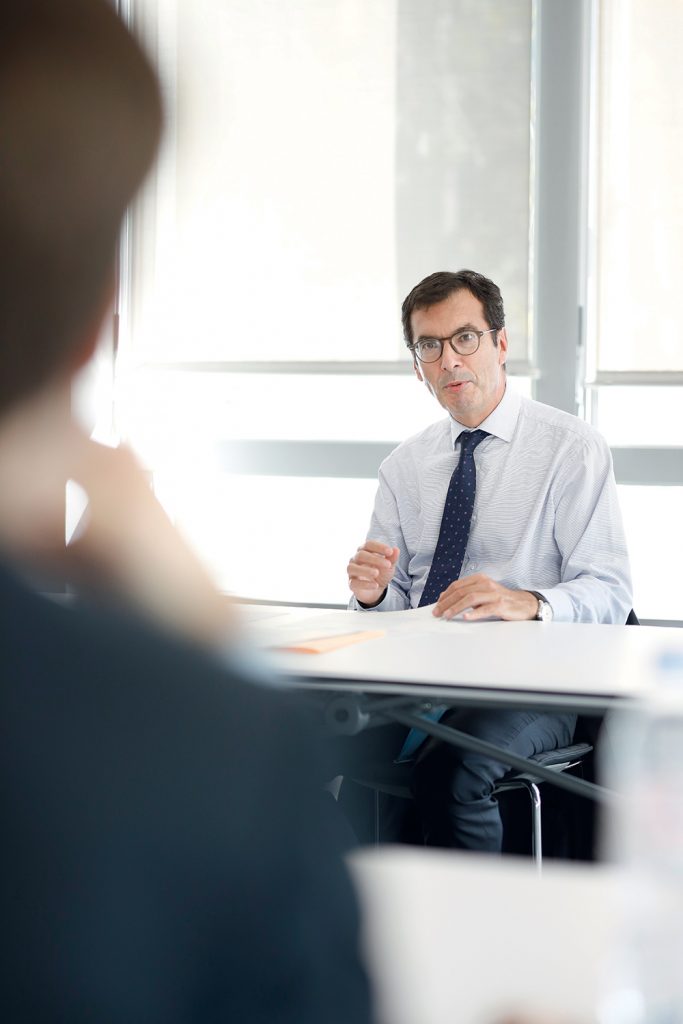Jean-Pierre Farandou, CEO of the SNCF, Answers Students’ Questions

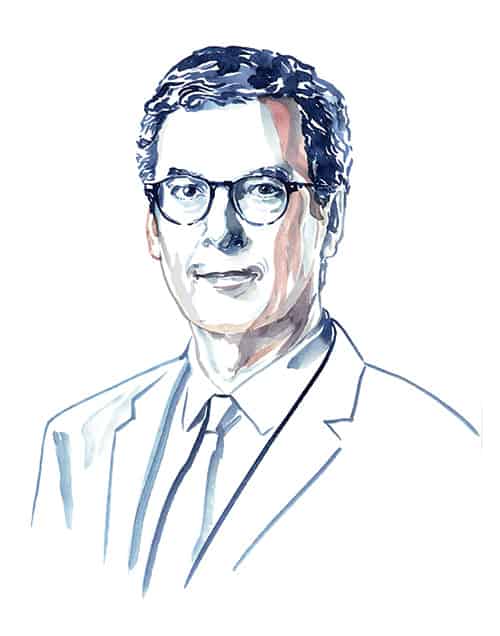
1957 – Born in Bacalan, a working-class neighborhood north of Bordeaux; his father is a customs agent and his mother a teacher.
1976 – Began studying at the École des Mines (Mines ParisTech) in Paris.
1980 – An engineer with a mining company in Colorado (U.S.)
1981 – Began working at the SNCF, where he has remained
1996 – General Director of Thalys
2002 – Head of the SNCF in the Rhone-Alpes region, whose local train network is France’s biggest
2006 – Head of SNCF Proximités, which combines Transilien, TER, Intercités and the Keolis-Effia group
2012 -President of Keolis, a private mass-transit operator 70% owned by the SNCF.
2019-CEO of the SNCF group
Three HEC Paris students met with Jean-Pierre Farandou at SNCF headquarters just a few days after the government had announced it would grant 4.7 billion euros in state aid to the railway. Appointed head of the SNCF group a year ago, the 63-year-old Farandou has been with the SNCF his entire career. He began as the head of the Rodez train station in 1981, before these students were even born, and he has stayed with the SNCF ever since. Today, he’s confronting all kinds of challenges. Unexpected delays, strikes and failures in informing passengers earned the SNCF the “Golden Cactus” award from the magazine “60 Million Consumers” last year for “spoiling the life of French people more than any other company”.
It’s not easy to lead a group that’s been trying for years to upgrade its image (most recently with the low-cost Ouigo service). Standard-bearer for positive labor relations, famous for speaking “rail worker” as his mother tongue, the new CEO got through the covid crisis and isn’t afraid to shake things up. “In the 1980s, a railway worker in a station would manage train traffic, sell tickets, even sweep the floor, and no one was surprised by this,” he declared to elected officials. At a time when 38% of the rail network is handling 80% of rail traffic, he threatens to shut down services if the government doesn’t dip into its pockets. His guiding principle: decentralize the organization and abolish its taboo on profitability. Before the interview, the CEO spent a few minutes getting to know the students and made a point of defending his actions, just like a politician. Now that the aviation industry has been threatened with a 4.2-billion-euro “ecotax”, he is happy to point out that rail transport is environmentally friendly. So, it’s the future.
A stressful year

Margaux entered HEC in 2018 with the goal of “meeting inspiring people”. A rugby player with a keen interest in environmental protection, she plans to be a journalist.
2018-2019 – General secretary of KIP, the HEC Paris student media
2020 – Internship in digital marketing at Le Monde
2020 – Commentator for a program on B Smart TV, Stéphane Soumier’s new economics-oriented channel.
Margaux Boulte: You were named head of the SNCF in November. Since then, you have had to mop up several successive crises. An internal labor dispute, strikes against retirement reforms, the coronavirus pandemic… The job became much more complex than expected. If you had it to do over again, what would you do differently?
Jean-Pierre Farandou: Not to brag, but I think my decisions weren’t so bad. It’s true that I found myself handling a crisis almost immediately. From the first month I was at my new post, in November, there were rumblings throughout the group because of an accident that had happened at a level crossing. [Note: a commuter train hit a truck convoy in the Champagne-Ardenne region.] Labor unions claimed that the conductor’s safety hadn’t been protected. Several conductors exercised their “right to refuse” and stopped working. Their reaction revealed a more profound problem, a significant tension throughout the company. My interpretation was that the issue wasn’t so much conductors’ safety but rather the isolation of train conductors, who are less and less likely to have the company of SNCF agents working on board their trains. I established a working group to re-establish a dialogue with the unions concerning how trains are operated. That particular uproar died down, and then came the strikes about retirement reforms in December. This concerned retirement all over the country, not just within the SNCF, but attention was focused on the SNCF because of its unique retirement system. As the holidays grew closer, my number one priority was to make sure people would be able to travel to be with their families at Christmas. We avoided a total shutdown thanks to a constructive dialogue with the labor unions. They didn’t do anything improper and people were still able to do their jobs. As for the overall issue, that was the government’s responsibility. I couldn’t do much about that.
“Over the summer, 85% of our customers came back.”
Margaux: How did you handle the covid 19 crisis?
J.-P.F.: The first challenge was to put in place all the government’s mandated protective measures on the trains, in the stations and in our workshops. It was my job to protect the health of 140,000 employees who were threatened by a virus that could take very aggressive forms. We analyzed all our procedures, set up social-distancing measures, developed telecommuting and set up partial unemployment for some workers. In other words, we completely overhauled the way the company works in order to protect our customers and our employees. During the lockdown, we provided transportation for healthcare workers and kept operating 70% of our freight trains so that companies could continue to function. After that, we served people going on their summer holidays. We lowered prices and put strict protective measures in place so that French people, who were a bit worried, would travel by train again. The result: 85% of our customers – 20 million passengers – came back over the summer. More than we had dared to hope for.
Margaux: Not everything went so well this summer, though…
J.-P.F. : You’re thinking of the big August 30 fiasco on the Basque coast. [Note : trains from Hendaye to Paris ran 20 hours late.] That didn’t have anything to do with covid. It was a major industrial accident caused by a series of electrical malfunctions in containers. A train broke down and blocked two tracks south of Bordeaux. All southwestern France was blocked. Thousands of passengers were inconvenienced. We did the best we could; we brought in more than 200 rail workers, aid volunteers, etc. But I admit we could have done better about informing passengers. It’s a blot on our record for the summer.
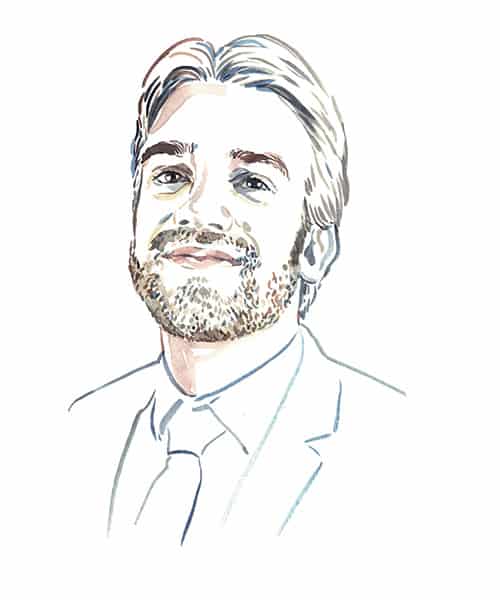
Victor is working toward diplomas in economics from both HEC and Sciences Po Paris. He is currently interning at a consultancy firm doing economic and financial analyses. He believes that public authorities of the future should be guided by both public interest and private enterprise.
2018 – Entered HEC Paris
2020 – Consultant on the banking sector at Ipso Facto Expertise
2021 -Masters in public affairs at IEP Paris
Victor Hondré: The government’s recovery plan budgets 4.7 billion euros in support of the rail system, of which 4 billion is earmarked for the SNCF. Is this amount sufficient to meet the group’s urgent financial needs, given that it’s more than 38 billion euros in debt?
J.-P.F.: It’s enough for us to stay on track financially. Covid is a kind of meteorite that crashed into the SNCF planet. It created a huge hole needing to be filled, and it compromised our financing for upgrading our network, which is fundamental to our activity. The recovery plan has filled that hole and will also help support further development of freight traffic. Those 4 billion euros give us what we need to pursue our strategy.
The SNCF roadmap
Diego Davo : Let’s take a look at that strategy. For the past few months, many companies have stated their reason for being. What is the SNCF’s?
J.-P.F.: We are revising our mission statement at the moment and should be ready to announce it by the end of the year. Overall, the SNCF’s goal is to create transport solutions for everyone in a way that protects the planet. By 2030, we want to be the European champions of sustainable mobility, for passengers as well as for freight traffic. Focusing on our core activity, railways, and our home base, France. Above all, we must meet the needs of French people who want a service they can count on, 24/7, all year long. The blocked trains in southwestern France made it clear that we still have work to do. Once we have met this challenge, we can start building tramways in Melbourne or providing logistics services in Shanghai.

Franco-Costa Rican, Diego spent eight years in Latin America. General Secretary of KIP, he wants to become a diplomat to help build stronger economic ties between France and Latin America.
2003-2011 – Lived in Costa Rica and then Honduras
2018 – Guide at the Eiffel Tower
2020 – University exchange program with the National University in Singapore, then an internship at Rosaly, a fintech company specializing in payment systems.
Diego: Isn’t there a contradiction between the SNCF’s economic goals and its social role? A lot of smaller rail connections have been closed down and local elected officials are protesting that their areas have been abandoned.
J.-P.F.: Those officials’ complaints are justified, but this is a public-policy issue. Local railway services are expensive to operate and they bring in limited revenues. Should we serve every area, even sparsely populated ones? And should we do this with trains or with other means, such as buses? If the government wants us to maintain services to less populated areas, then it needs to give us the money we need to do that. We can’t pay for this out of our own resources. On January 1, the SNCF became a public limited company. We can’t allow ourselves to make unreasonable investments. The recovery plan shows that the government recognizes this, and financing for local rail services is included in that plan.
Margaux: So if the government doesn’t support you, you could eliminate more rail services?
J.-P.F.: Our status as a public limited company means that we have to be more rigorous about profitability and debt. As the executive director, I have to consider and balance every economic aspect. We provide train services when government contracts or other kinds of financial support allow us to do so, but we are not aiming to replace public services.
Victor: You have emphasized that railway services are your core activity. What about the trend toward diversification we have seen in the past few years, such as ride-sharing or private cars with drivers?
J.-P.F.: These days we need to focus on being careful and frugal. We took a beating during the covid crisis. Now is not the time for daring diversification. That said, there are some attractive possibilities in digital development. We could move up the value chain, evolve from transport to mobility, and maybe, in the future, provide personal mobility services. Take telecommuting as an example. People are moving around less, which cuts into our activities. But if the SNCF created coworking areas in our stations, we could regain some of our customers who are working from a distance.
Victor: How do you account for the failure of IDVroom and LeCab, which the SNCF eventually sold?
J.-P.F.: We tried something and it didn’t work. Tested and failed. I’ve taken note. I am very familiar with the LeCab project because I was president of Keolis at the time. There was a culture shock. Keolis is a private company, far from the stereotypes people apply to the SNCF. But it just didn’t work out with the 28-year-old startup entrepreneurs. We weren’t able to get a budget, much less a business plan for the next three years. As investors, we felt we weren’t really respected. And the management’s strategic choices turned out to be misguided.
Diego: Strikes are a real scourge. They drive French people crazy and cause huge losses (600 million euros in 2019 alone). Will labor relations ever improve at the SNCF?
J.-P.F.: 2019 was not a typical year. The retirement reforms made the SNCF’s retirement plan a target, since it is so closely associated with the organization and so symbolic. In the SNCF culture, retirement is considered to be like a deferred salary. Rail workers accept being paid lower salaries because they know they can count on a good retirement that they can begin sooner than most. I should add that unions are very strong in the transport sector in France and elsewhere. When I was at Keolis, I had to deal with very aggressive unions and destructive strikes in Australia, the United States and even Germany. In the transport industry, labor representatives have a lot of power because they can exert strong pressure through blocking services. This gives them a distinct advantage in the bargaining process. This is true in all democracies. What perhaps makes the SNCF different from its counterparts in other countries is that here the unions are very political; I’m thinking of one in particular [note: the CGT]. It sees itself as the last stronghold against the government, the final barrier against neoliberal capitalism.
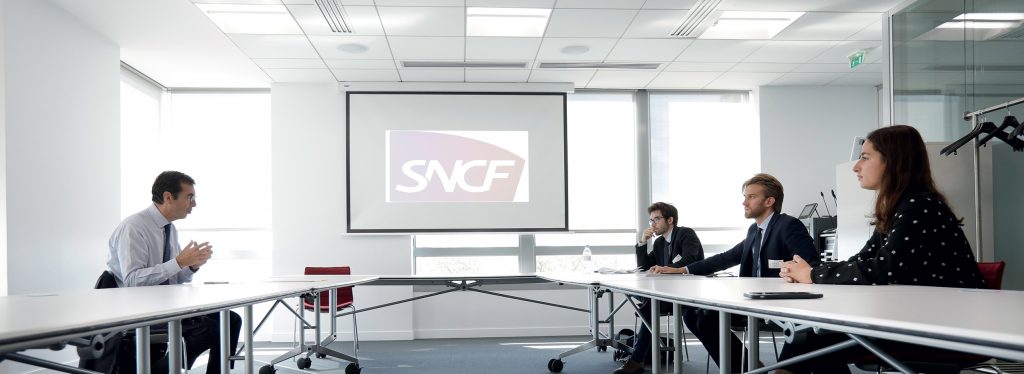
The future of rail services in France
Margaux: The Citizens’ Convention on Climate promotes developing rail services as an alternative to air and road transport. The SNCF aims to be a zero-carbon-emissions enterprise by 2035. But, so far no new measures have been budgeted. How will you reach this goal?
J.-P.F.: Rail transport is 20 times less polluting and uses six times less energy than air transport. Knowing this, we should all be traveling by train! Well, OK, Diego, maybe you can’t get to Costa Rica by train; sorry! [Laughter.] Compare it to other kinds of transport. Think of how much energy it takes to fly a plane: you have to lift several tons into the air. As for the car, its tires grip the pavement. If its motor dies, it is very quickly stuck. The train, in contrast, travels on iron wheels running on steel rails. Once a train is in motion, it will continue to go forward even if its engine is turned off. Only air pressure slows it down. This is why TGVs are streamlined. If you shut down the engine of a Nevers-Paris TGV in the Morvan, it will still manage to get to the Gare de Lyon! These advantages of rail transport make me hopeful. A technology with all these plus factors has a future.
Margaux: OK, but zero carbon by 2035? How will that be possible?
J.-P.F.: Mainly by changing the fuel that gets trains in motion. Around half of France’s train services [41% of the 28,000 km of tracks] rely on diesel power. These lines are the least used. They don’t have enough traffic to make switching them to electricity profitable. Hydrogen-powered engines are a promising solution. This technology will be operational by 2035. And from now until then, we can set up hybrid trains that operate just like hybrid cars. We will do this next year on the service between Marseille and Aix-en-Provence. The trains will run on diesel for most of the route but will run on electricity in the two cities. Finally, the SNCF will also reach zero carbon by installing solar panels and windmills and by recycling waste products.
Victor: Train travel is often more expensive than air travel.Do we have to pay more to cut down on carbon emissions?
Margaux: I had this experience. A month ago, I went to Cannes. I took the train. I didn’t even consider another option. My friends, though, reacted to this. It’s not easy to pay 100 euros for a train trip when you’re an intern.
J.-P.F.: I don’t think low-cost air travel is going to last, especially after the impact of covid 19. If you take environmental costs into account, you won’t be paying just 30 euros to fly from Paris to Lisbon. Airplane ticket prices don’t reflect total costs, in that they don’t include the “true” price of carbon emissions. You’ve heard of flygskam. In northern Europe, young people no longer want to travel by plane. They prefer night trains.
Diego: You mentioned hydrogen. What new technologies are you most excited about? We hear a lot about Hyperloop here in France.
J.-P.F.: Hyperloop is a great research project, but it needs huge investments. Tubes would have to be installed over thousands of kilometers. I think that the future will be dominated by hydrogen power, digital development and connected trains. I have a friend who’s an executive who travels all the time between Paris and other parts of France. He works while he’s on trains. “I don’t get bored, I don’t waste my time. I include my trips in my plans for my work week,” he told me. This isn’t a very spectacular example, but it’s important. And there are some innovations that passengers don’t see but which are revolutionizing the sector. Big data, for example. In the coming years, we’ll have sensors all over tracks and in trains that will be emitting data non-stop. The system will sound alarms in case of any malfunctions, and we can ensure preventative maintenance. My dream is to have zero breakdowns. Just like in the film “Minority Report” by Steven Spielberg, where criminals are caught even before they commit crimes! We’ll be able to spot and repair malfunctions even before they occur.
“We need freight traffic to help us achieve the ecological transition.”
Diego: Prime Minister Jean Castex announced at the end of July that Fret SNCF (SNCF Freight) will be the “first stage in the rebirth of rail transport”. This subsidiary has been in the red for 23 years, and freight transport by rail accounts for less than 10% of overall merchandise transport in France. Why should things be any different this time? Wouldn’t it be better to focus on successful activities?
J.-P.F.: We need freight transport by rail to achieve the ecological transition. When I take the autoroute in southwestern France, I see endless lines of trucks hauling goods to Spain. They pollute, cause traffic jams, wear out road surfaces. It would be better for everyone if more cargo were transported by train. This comes back to the “isolated container” problem, in our jargon. A client company has 30 or 35 tons of merchandise to transport. This is the equivalent of a truck load, so we are in direct competition with road transport. Once a container is filled, it’s brought to a train, which goes to a shunting yard, then its final train station before being delivered to its destination. This could take four days! Meanwhile a truck would have had time to make four round trips. This is another example where public policy is crucial. France, and Europe in general, should adopt measures to level the playing field between rail and road transport.
Career and character
Victor: You were a depot manager in Paris and a station master in Rodez; you climbed up every step of the ladder. Is your 100% SNCF profile a handicap for you in achieving the transformations the company needs?
J.-P.F.: You can’t rub a company’s DNA the wrong way, especially when it has 140,000 employees with the means to resist. I know all about this. I know what makes this company tick. I love the SNCF. I’ve spent my whole career here. I understand what this profession involves. I’ve worked as a conductor and as a signalman. A few days ago, I visited a signal tower near Saint Lazare. The person I met with was friendly and relaxed, even though usually, I was told, he is pretty grumpy. Why? Because we talked about his profession. You can’t transform a company against its will; you need to work along with it. To achieve that, you have to understand how it operates and be able to communicate with its employees.
Victor: Having spent your whole career at the SNCF and formed relationships throughout the company, can you really make momentous changes the same way an outsider could? For example, like Ben Smith at Air France?
J.-P.F.: Ben Smith is successful at Air France because he came out of the aviation industry and he understands everything about the profession. Just like me for railways! In fact, I have spent a third of my career outside the SNCF, in its subsidiaries. My last company, Keolis, is a 100% private enterprise, open to competition. I spent one week every month abroad and I fought for contracts every week. Every euro or dollar we earned was won against competition. I learned a lot of lessons. I think my experience is just what the company needs today. In 10 years, the context will be different and that might not still be true.
Margaux: You’ve spent 40 years in the same group. This is unimaginable for people of my generation. Wouldn’t you have liked to have had a more diverse career?
J.-P.F.: Well, I’m the president of the SNCF; I don’t have much to regret! [Laughter] I’m 63 years old; you are a bit over 20. There’s a big generation gap. Things weren’t viewed in the same way when I was a young graduate. I got my diploma from Mines ParisTech, but I wasn’t really cut out to be an engineer. I wanted to be involved in management, and to be in touch with customers. The SNCF understood this. I spent 10 years working in production, security and in-the-field management. Then the group dared to give me one month’s training in marketing. They didn’t send me to get an MBA from HEC! I was head of the Thalys project, human-resources director for executives, boss of Keolis… I have never been bored.
Diego: You’re a fan of classical music. Does your love of music help you to handle everyday stresses?
J.-P.F.: Yes. I love Bach’s music, very orderly and reassuring. I also like romantic music, which stimulates the imagination. Both are useful in life: stability and inspiration.
Margaux : You also played rugby. What position?
J.-P.F.: Given my size, I started out as a fullback. I ran really fast! When I was around 27 or 28, I started playing inside center. I set up plays instead of running around like a maniac.
Margauz: Does that position fit your personality?
J.-P.F.: Yes, you can really see the whole game from back there, and you can manage it your own way.
Margaux: But you have less direct impact on the match.
J.-P.F.: You can fill in the holes, sense the gaps! It’s reassuring for your teammates to know that there’s someone reliable in the background. Do you know how we apply the principle of the backward pass to the management world?
Margaux: No; tell me…
J.-P.F.: It symbolizes the essential need to have some background support. In a company, it’s useless to dash around in your corner if, when you turn around, there’s no one there. It’s the last one who moves everything forward: the final player to receive a pass is the one who crosses the line. A team’s progress is measured by the final player. We can’t be successful unless we play together as a team.
Published by Thomas Lestavel


